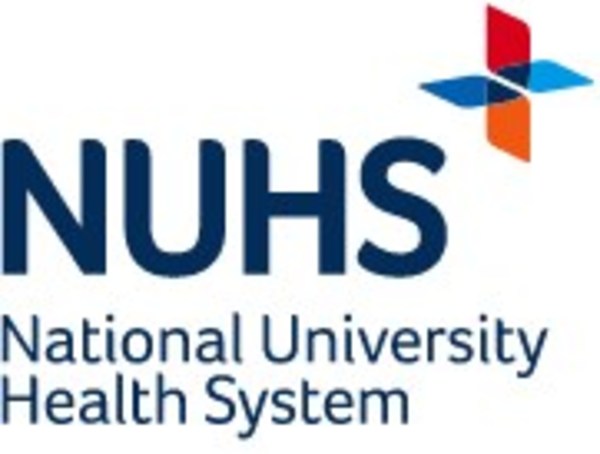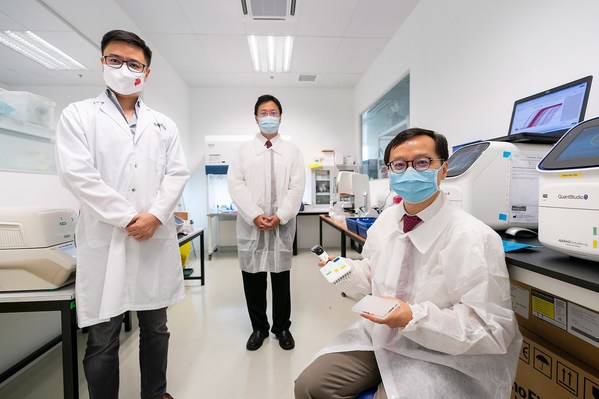Singapore Clinicians and Scientists Achieve Big Leap in Early Diagnosis of Gastric Cancer Through the Development of Non-Invasive Blood-based Test

SINGAPORE,Oct. 23,2020 -- After eight years of discovery research,product development and clinical validation involving 5,248 subjects from Singapore and South Korea,a team of clinicians and scientists from Singapore has developed a non-invasive blood-based diagnostic test for gastric cancer (also known as stomach cancer). The test can potentially be used as a cost effective screening test for the early detection of gastric cancer.

Members of the team involved in the development of a non-invasive blood-based test for gastric cancer (from right): Professor Jimmy So,Head and Senior Consultant with the NUH Division of General Surgery (Upper Gastrointestinal Surgery),Dr Calvin Koh,Consultant with the NUH Division of Gastroenterology and Hepatology and Dr Zhou Lihan,Co-founder & CEO of MiRXES.
Gastric cancer is the third leading cause of cancer deaths worldwide according to World Health Organization (WHO) statistics. In Singapore,it is the fifth and sixth cause of cancer deaths in males and females respectively,causing approximately 300 deaths every year. Gastric cancer mortality is high due to late presentation. Endoscopy is currently the standard diagnostic test for gastric cancer. However,it is perceived as invasive and expensive,hence many patients are reluctant to undergo endoscopy even if they have gastric symptoms.
Led by Professor Jimmy So,Head and Senior Consultant with the National University Hospital's (NUH) Division of General Surgery (Upper Gastrointestinal Surgery),Professor Yeoh Khay Guan,Senior Consultant with the NUH Division of Gastroenterology and Hepatology,and Associate Professor Too Heng-Phon from the National University of Singapore Yong Loo Lin School of Medicine's Department of Biochemistry,the team included clinicians and scientists from the National University Health System (NUHS),the Bioprocessing Technology Institute (BTI) of the Agency for Science,Technology and Research (A*STAR),national platform Diagnostics Development (DxD) Hub,and MiRXES Pte Ltd,a Singapore headquartered molecular diagnostic company which was spunoff from A*STAR's BTI.
The team started this project in 2012 by first examining 578 microRNA[1] candidates in 682 patients. They discovered a panel of 12-microRNA biomarkers that can differentiate gastric cancer patients from normal patients with an accuracy over 92%. Based on this panel of 12-microRNA biomarkers,the teamcreated a clinical assay (or test kit) which was manufactured to clinical standards. From year 2013 to 2018,the team validated this blood panel in a multicentre cohort involving more than 5,000 subjects from Singapore[2],making this study the most extensive evaluation of circulating microRNAs as biomarkers for gastric cancer detection to date worldwide.
"The majority of gastric cancer patients are diagnosed at advanced stages,for which the five-year survival rate is lower than 5%. Early detection is thus the key to reducing death from gastric cancer. To bring about a meaningful fall in the gastric cancer mortality rate,an effective strategy that would detect gastric cancer early so as to enable prompt intervention is required. This non-invasive blood test is a breakthrough in gastric cancer diagnosis and it may potentially be used as an effective screening test for the early diagnosis of gastric cancer," explained Professor So,who is also the Head and Senior Consultant with the Division of Surgical Oncology,National University Cancer Institute,Singapore.
Outperforms conventional blood-based biomarkers
The performance of this test was confirmed with endoscopies and biopsies and was shown to detect gastric cancer with high sensitivity across age groups,genders,ethnicities and tumour stages. The test is able to detect 87% of all gastric cancers,including 87.5% of patients with stage I cancers.
In addition,the results showed that this blood-based test was more accurate than any of the existing conventional blood-based biomarker tests for gastric cancer detection. The findings were published in Gut,a leading international medical journal in October 2020[3].
Cost-effective risk assessment tool for gastric cancer before endoscopy
Based on a cost-effectiveness analysis to explore the economic and health impact of using the test in a hypothetical national screening programme in Singapore,the team has found that it may be a cost-effective screening tool for gastric cancer in high-risk groups[4] as it costs much less[5] than endoscopy.
This test thus provides an alternative solution for those who would like a better understanding of their risk of contracting gastric cancer in evaluating their need for endoscopy. Results from this test would help to identify patients who are at high risk of stomach cancer to undergo endoscopy,thereby reducing the reliance on endoscopy[6].
"With further health technology assessment to demonstrate the effectiveness of this assay as a screening tool in the Singapore population,we are hopeful that the assay will be implemented as a screening test for gastric cancer when used in combination with follow-up endoscopy for high-risk patients," shared Professor So.
Associate Professor Too however emphasised that,"Thetest does not replace endoscopic evaluation. We believe this assay provides an option for patients who might not be keen on initial endoscopic screening and adds to the current cancer detection tool armamentarium,just as the stool DNA test is an option for colon cancer screening. Furthermore,the convenience and non-invasiveness of this test allows the public to have access to better health-care."
Future plans
The research team is planning to evaluate the feasibility of utilising this test in the primary care setting to identify people who are at risk of contracting stomach cancer. Additionally,further research on improving the usability of test kit is also currently underway.
This non-invasive blood-based assay was co-developed with MiRXES Pte Ltd and the DxD Hub,which led the assay optimisation,analytical verification and clinical validation of the product. The assay has been commercialised as GASTROClear™ and has successfully attained European CE mark[7] in 2017 and gained the Health Sciences Authority's approval in 2019. MiRXES is also conducting local clinical studies to seek regulatory approval of GASTROClear™ in China and Japan,which have the highest numbers of new stomach cancer cases per year globally. The test takes about three hours to run in a clinical lab and the test report can be delivered to the patient's doctor within a week.
The research was supported by Singapore Ministry of Health's National Medical Research Council under its Bedside & Bench grant (NMRC/ BnB/0014b/2014),the Translational and Clinical Research grant (TCR/009-NUHS/2013),and the Technology Development Grants from A*STAR. The study was supported by the Singapore Gastric Cancer Consortium (SGCC),a national translational research group comprising clinicians and scientists working in stomach cancer research from academic medical centres,universities,hospitals and research institutes across Singapore.
[1]MicroRNAs (miRNAs) are small non-coding RNAs that regulate gene expression post-transcriptionally. Aberrant expression of miRNAs has been linked to the development of many diseases,including cancer. Cell-free miRNAs have been shown to circulate stably in serum and plasma,and dysregulation of their expressions correlate with cancer onset and progression,making them attractive biomarker candidates.
[2]Patients were between the ages of 40 and 90 years,who were scheduled to undergo gastroscopy based on standard clinical indications at National University Hospital and Tan Tock Seng Hospital in Singapore from 2013 to 2016.
[3]https://gut.bmj.com/content/gutjnl/early/2020/10/07/gutjnl-2020-322065.full.pdf
[4]50 years and above male Singaporean Chinese with previous infection with Helicobacter Pylori (HP)
[5]Cost varies according to different healthcare providers. In public hospitals for example,the cost is estimated to be less than S$200.
[6]Patients with positive 12-microRNA test results will be recommended to undergo endoscopy.
[7]This signifies that the product has been assessed to meet high safety,health and environmental protection requirements.
For media enquiries,please contact:
YUANYI LI
Communications Office
National University Health System
Email: yuanyi_li@nuhs.edu.sg
About the National University Health System (NUHS)
The National University Health System (NUHS) aims to transform how illness is prevented and managed by discovering causes of disease,development of more effective treatments through collaborative multidisciplinary research and clinical trials,and creation of better technologies and care delivery systems in partnership with others who share the same values and vision.
Institutions in the NUHS Group include the National University Hospital,Ng Teng Fong General Hospital,Jurong Community Hospital and Alexandra Hospital; three National Specialty Centres - National University Cancer Institute,Singapore (NCIS),National University Heart Centre,Singapore (NUHCS) and National University Centre for Oral Health,Singapore (NUCOHS); the National University Polyclinics (NUP); Jurong Medical Centre; and three NUS health sciences schools – NUS Yong Loo Lin School of Medicine (including the Alice Lee Centre for Nursing Studies),NUS Faculty of Dentistry and NUS Saw Swee Hock School of Public Health.
With member institutions under a common governance structure,NUHS creates synergies for the advancement of health by integrating patient care,health science education and biomedical research.
As a Regional Health System,NUHS works closely with health and social care partners across Singapore to develop and implement programmes that contribute to a healthy and engaged population in the Western part of Singapore.
For more information,please visit http://www.nuhs.edu.sg.